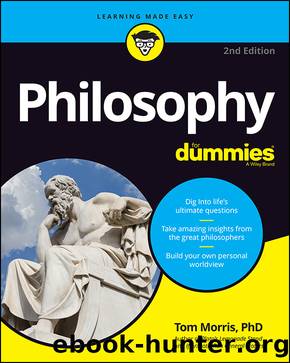Philosophy for Dummies by Morris Tom;

Author:Morris, Tom; [Morris, Tom]
Language: eng
Format: epub
Publisher: John Wiley & Sons, Incorporated
Published: 2022-03-28T00:00:00+00:00
If materialists, in claiming that dualistic causation canât be explained, mean that no answer of type (1) can be given concerning any instance of mind-body causation, they are just clearly wrong. If I say that I, with my decision to raise my arm, caused it to go up, I can explain that instance of causation by referring to the general principle that decisions to lift arms, or move body parts more generally, typically result in the bodily movement intended, unless something interferes. And if materialists mean that no explanation of type (2) can be given, they are also wrong. My decision to raise my arm caused my arm to rise. How? By causing certain neural events, N, which caused certain muscular events, M, which resulted in the armâs rising.
But if the materialist insists that, in the last analysis, we canât explain how any mental event could cause any physical event to happen, a simple response is available for the dualist. In the last analysis, we can never explain what it is for any event of any sort to cause another event. Causation itself is a mystery. The simple, and confounding, truth is that there is no generally accepted scientific or philosophical account of causation that allows us to ever really understand, in the deepest possible sense, the nature of causation. So we never really know, in the deepest sense, what it is for anything to cause anything else. Therefore, the dualist is in no worse position than anyone who believes in any sort of causation in this world. The philosopher Schopenhauer once declared that âThe more unintelligent a man is, the less mysterious existence seems to him.â I would agree that our higher flights of intellectual curiosity continue to uncover mysteries as yet beyond our ken. Causation is one of them, and so itâs not surprising that many physicists now talk of probabilities instead of necessities in causal relations.
The last flaw in this mystery objection â in both its forms, concerning composition and causation â is to think that a mystery is, in itself, inherently unbelievable. Anyone who pays any attention whatsoever to the discoveries of contemporary science in its most fundamental research is confronted left and right by mystery. It is a mystery that this universe exists at all. It is a mystery that one and the same species can include Mother Theresa, Albert Einstein, Adolph Hitler, and a guy who yelled at me the other day for driving too slowly. It is a mystery that good people can do very bad things. It is a mystery that human mathematics can plumb the depths of physical reality. And donât get me started on quantum physics.
Rather than following the materialist in saying, âMysterious, therefore false,â I am inclined to go in the opposite direction and suspect that mystery can be a sign of deep truth. As Walt Whitman once intimated, somewhat mysteriously, âMystery is not the denial of reason, but its honest confirmation: reason, indeed leads inevitably to mystery ⦠mystery and reality are two halves of the same sphere.
Download
This site does not store any files on its server. We only index and link to content provided by other sites. Please contact the content providers to delete copyright contents if any and email us, we'll remove relevant links or contents immediately.
The remains of the day by Kazuo Ishiguro(8403)
Tools of Titans by Timothy Ferriss(7823)
Giovanni's Room by James Baldwin(6818)
The Black Swan by Nassim Nicholas Taleb(6773)
Inner Engineering: A Yogi's Guide to Joy by Sadhguru(6446)
The Way of Zen by Alan W. Watts(6290)
Asking the Right Questions: A Guide to Critical Thinking by M. Neil Browne & Stuart M. Keeley(5360)
The Power of Now: A Guide to Spiritual Enlightenment by Eckhart Tolle(5344)
The Six Wives Of Henry VIII (WOMEN IN HISTORY) by Fraser Antonia(5241)
Astrophysics for People in a Hurry by Neil DeGrasse Tyson(5004)
12 Rules for Life by Jordan B. Peterson(4166)
Housekeeping by Marilynne Robinson(4070)
The Ethical Slut by Janet W. Hardy(4042)
Skin in the Game by Nassim Nicholas Taleb(3973)
Double Down (Diary of a Wimpy Kid Book 11) by Jeff Kinney(3934)
Ikigai by Héctor García & Francesc Miralles(3900)
The Art of Happiness by The Dalai Lama(3851)
Skin in the Game: Hidden Asymmetries in Daily Life by Nassim Nicholas Taleb(3731)
Walking by Henry David Thoreau(3685)
